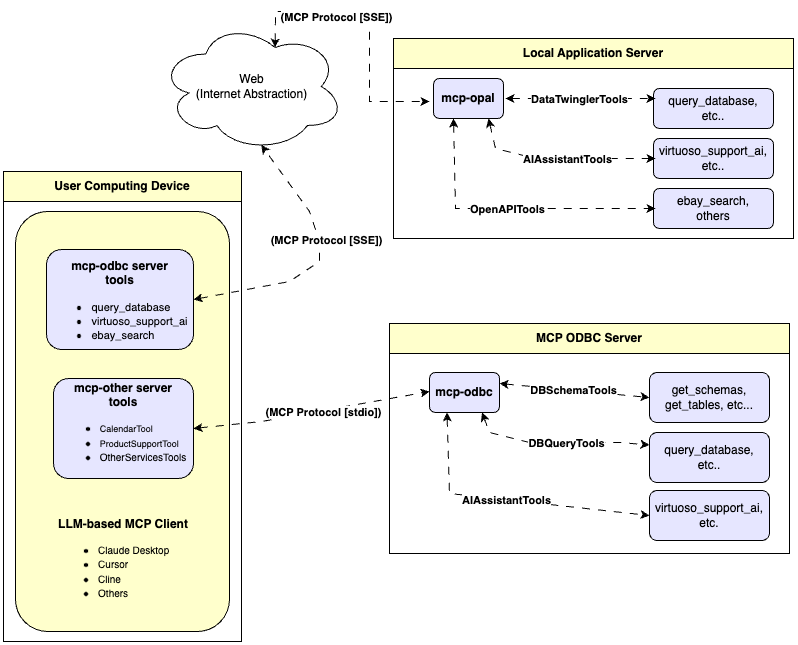About
A lightweight MCP (Model Context Protocol) server that uses FastAPI, pyodbc, and SQLAlchemy to expose database schemas, tables, and query execution over ODBC. It supports Virtuoso and any SQLAlchemy‑compatible DBMS, delivering results in JSONL or Markdown.
Capabilities

The OpenLinkSoftware MCP SQLAlchemy Server bridges the gap between modern AI assistants and relational databases by exposing a lightweight, FastAPI‑based MCP endpoint that speaks SQLAlchemy. Instead of hardcoding database access logic into each AI workflow, developers can now tap into a single, standardized interface that automatically translates MCP tool calls into SQLAlchemy operations over any ODBC‑compatible backend. This abstraction is especially valuable when working with legacy systems such as Virtuoso or when a project must support multiple database engines without rewriting data‑access code.
At its core, the server offers a suite of declarative tools that mirror common database introspection and querying tasks. Get Schemas lists all available schemas, while Get Tables and Describe Table provide detailed metadata about table structures, including column types, nullability, primary and foreign keys. Search Tables allows filtering by name substrings, making it easy to locate relevant tables in large schemas. For data retrieval, the server offers two output formats: a machine‑friendly JSONL stream suitable for downstream AI processing, and a Markdown table that can be rendered directly in chat or documentation. Additionally, the server supports executing stored procedures (primarily for Virtuoso) and arbitrary SQL queries through Execute Query tools, giving developers full read‑only access to their data within the AI’s conversational context.
Real‑world scenarios benefit from this architecture in several ways. Data analysts can ask an AI assistant to “list all tables that contain a column” and receive an instant, formatted response without leaving the chat. Business intelligence teams can embed live query results into reports or dashboards by invoking Execute Query MD, while developers maintain strict separation between business logic and data access layers. Because the server relies on SQLAlchemy’s dialect system, adding support for PostgreSQL, MySQL, SQLite, or any other ODBC‑compatible database is a matter of updating the connection URL—no changes to the MCP tool definitions are required.
Integration with AI workflows is straightforward: once the MCP server is running, a client (e.g., Claude Desktop) declares it in its configuration file and supplies the necessary ODBC credentials. The AI then calls tools by name, passing parameters such as schema or table names. The server translates these calls into SQLAlchemy queries, streams results back in the chosen format, and closes the connection—all transparently. This pattern eliminates boilerplate code, reduces runtime errors, and ensures that data access remains consistent across all AI‑powered applications.
In summary, the OpenLinkSoftware MCP SQLAlchemy Server provides a robust, extensible bridge between AI assistants and relational data stores. Its focus on schema introspection, structured query execution, and dual‑format output makes it a powerful asset for developers who need reliable, repeatable database interactions within conversational AI environments.
Related Servers
MCP Toolbox for Databases
AI‑powered database assistant via MCP
Baserow
No-code database platform for the web
DBHub
Universal database gateway for MCP clients
Anyquery
Universal SQL engine for files, databases, and apps
MySQL MCP Server
Secure AI-driven access to MySQL databases via MCP
MCP Memory Service
Universal memory server for AI assistants
Weekly Views
Server Health
Information
Explore More Servers
Nile MCP Server
Standardized interface for LLMs to interact with Nile database
MCP Vulnerability Scanner
Scan IPs for vulnerabilities via MCP
FastMCP Chat
Python MCP server powered by FastMCP and OpenAI
Scrappey MCP Server
Bridge AI models to Scrappey's web automation
Ghidra MCP Server
Headless Ghidra for LLM-powered reverse engineering
Git Mob MCP Server
Co-author management for pair and mob programming